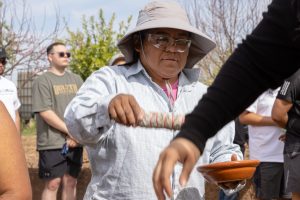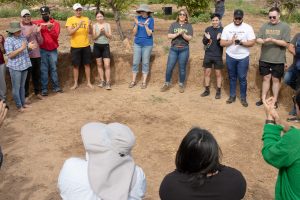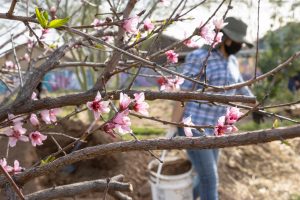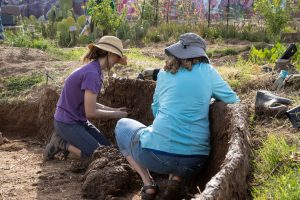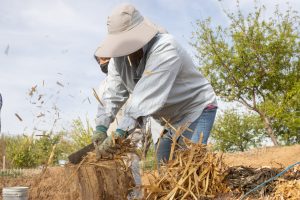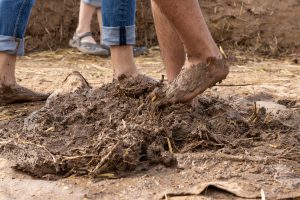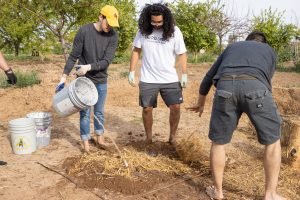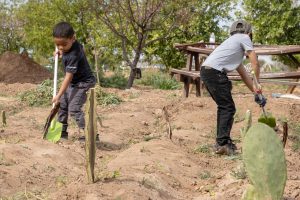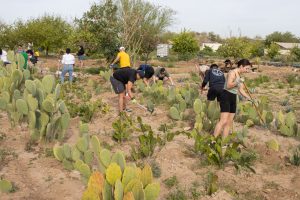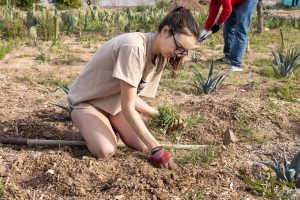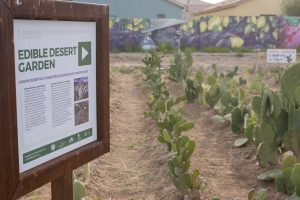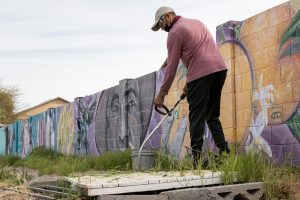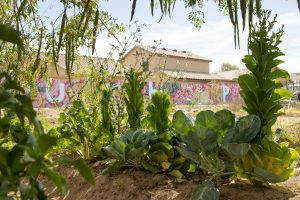- Slug: BC-CNS-Spaces of Opportunity. 770 words.
- 13 photos and captions are below; video available.
By Andrea Villalobos
Cronkite News
PHOENIX – As the sun reaches its zenith one Saturday morning in March, several south Phoenix residents use their feet to mix mud, water and hay to create adobe. Nearby, others use their hands to fashion a small, circular adobe wall, meant to connect their work to Mother Earth. They then burn incense to cleanse and energize themselves before returning to their gardening chores.
Blanca Abarca is a health promoter with the nonprofit Unlimited Potential who grows her own food at Spaces of Opportunity, a 19-acre farm at 12th Avenue and Vineyard Road. She also shares her knowledge as a volunteer, teaching the value of natural resources and the importance of connecting with Mother Earth, something passed down down to her by her Indigenous and African ancestors.
“I’m very proud of my roots, traditions, and culture. That’s taught from generation to generation.” Abarca said. “That connection with the earth, nature and spirituality helps us be better.”
Spaces of Opportunity – a partnership that includes Unlimited Potential, the Desert Botanical Garden and the Roosevelt Elementary School District – consists of small family gardens and a 10-acre incubator farm, as well as a farmers market. Its mission is to provide all south Phoenix families access to healthful, affordable food, promote active living and create strong bonds to individual cultures.
In her job, Abarca works with people from many different backgrounds.
“I work with people from Africa, Asia, Europe,” she said. “We work as a family.”
Spaces of Opportunity lies in the heart of a food desert, one of 43 across Phoenix. Food deserts are places where nutritious and affordable food isn’t readily available. In Maricopa County, 13.7% of residents live in a food insecurity state, and 43% typically have only enough money to get by.
Rising inflation only makes matters worse. According to the U.S. Bureau of Labor Statistics, the inflation rate in metro Phoenix was nearly 11% in February – 3 points higher than the previous February.
“There are families where sometimes both mom and dad have to work … the mom works a job, and the dad works two jobs. Sometimes they take turns,” Abarca said.
The city’s 2025 Food Action Plan, released in January 2020, shows that only 17% of Phoenix residents report eating five or more servings of fruit and vegetables per day, which is the recommended number for adults.
Spaces of Opportunity offers people the opportunity to learn how to lead healthier lives.
“We come back to our roots, and we learn to grow crops that are 100% organic, vegetables, and we use those in the food we make every day,” said Abarca, whose plot includes a nopal garden featuring several types of prickly pear cactus native to the Southwest and Mexico.
Alondra Morales first came to Spaces of Opportunity to learn about soil composition at a workshop she’d heard about on Instagram, and she returned to learn more from Abarca.
“I want to learn more about the earth, gardening and environmental justice,” she said. “I’m not really too familiar with gardening at all.”
Not only did young adults attend the workshop, but families with kids were happy to help as well. Under Abarca’s careful eye, children of all ages learned to respect Mother Earth as a living being.
“Aside from desert plants,” Abarca said, “we grow different types of vegetables, like lettuce, swiss chard, cauliflower and more. It’s also the season when we grow beets, carrots, chiles, tomatoes and maize.”
Guillermina Martínez comes to Spaces of Opportunity often, and her job as a volunteer is to clear weeds so the crops can thrive.
“We’re practically forgetting how to cultivate crops, how to plant food and how to grow crops, legumes and fruit trees,” she said.
Abarca teaches that it’s important to ask permission from Mother Earth before removing crops. If permission is sought and granted, give thanks, and the Earth will repay you when the crops are replanted.
That’s the message she shared during the gardening workshop in March.
After thanking Mother Earth, volunteers made a circle while Abarca burned a bundle of sage, rosemary, basil and spearmint to close the ceremony. They believe this ritual would help cleanse them and increase positive energy.
“Do you know what the best thing is about Mother Earth?” Abarca asked. “She doesn’t judge you or criticize you. If a vegetable doesn’t take, you plant it again and you just practice.”
Gardeners at Spaces of Opportunity grow food for their families and to sell at the farmer’s market every Saturday. In addition, Abarca and her team donate food to the market and share it with office workers at Unlimited Potential.
For more stories from Cronkite News, visit cronkitenews.azpbs.org.
